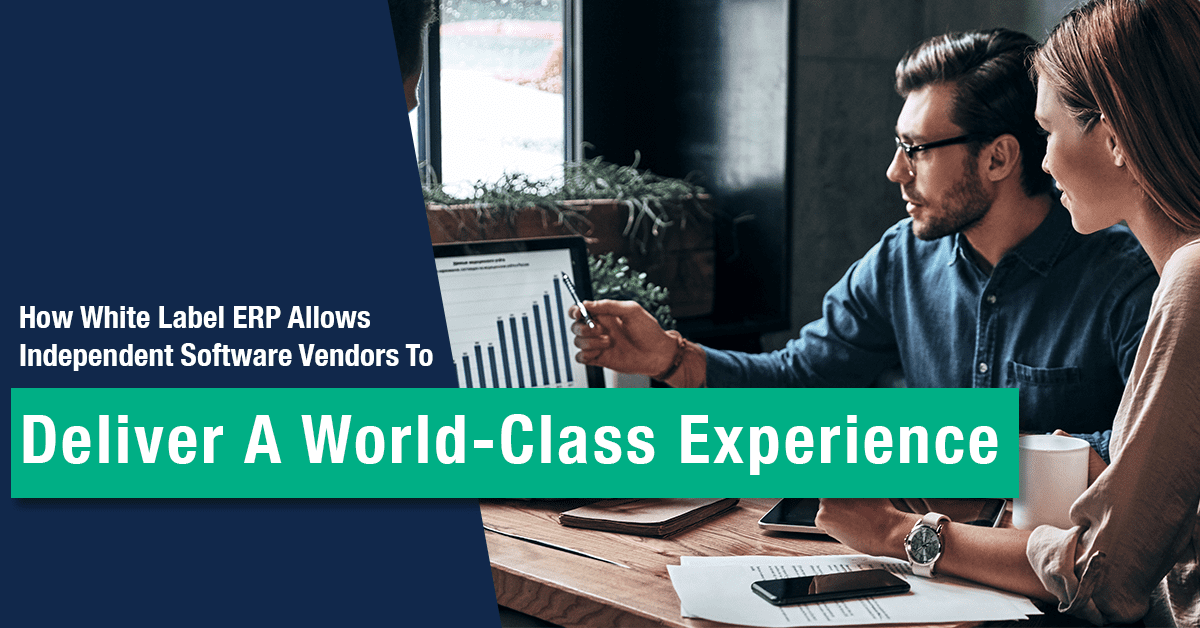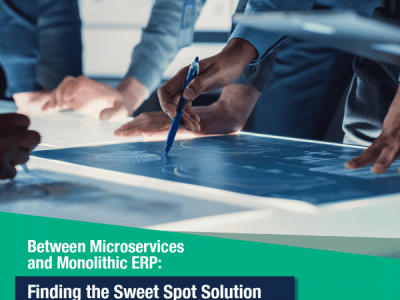
White-Label ERP is the prudent choice for any software vendor that wants to focus on market growth, innovation and/or diversification.
Once committed, how do you maximize the value of this solution to deliver that world-class experience? Arguably, it will depend on, and evolve with, the growing needs of your customers. Their requirements are your business objective – and increasingly they’re raising concerns about:
- Where cloud ERP fits into their business
- How to integrate eCommerce solutions seamlessly
- Opportunities to better serve their customers
- Supply chains coming under increasing scrutiny
They also question the ability of their ERP to deliver the level of business analytics sufficient to drive their own business growth.
Of course, these customers could choose an off-the-shelf ERP solution from one of the flagship vendors. But if we look at the needs of today’s businesses, one-size-fits-all solutions may not even be under consideration. That’s largely because IT decision-makers can choose from a large range of local or vertical ERP solutions that can or will cater for their business nuances in a much more flexible, consultative and cost-effective manner to that of global ERP providers.
If you’re a software vendor, a software reseller or a systems integrator looking to sweep up the new-age customer, the opportunity exists to re-brand White-Label ERP software as a means to satisfying their needs and growing your business. Let’s look at five key areas in which White-Label ERP has a clear advantage.
White Label Offers Speed to Market
The pace of technological change is exponential. By 2025, for example, there will be more than 21 billion IoT devices in use. In the next decade, 5G will transform the communications and networking landscape. As a result, any serious business is struggling not only to stay up to speed with customer expectations for connectivity and experience, but also to stay ahead of new technologies that could help them stand out from the competition.
For independent software vendors, it may just become too cumbersome to try and advance with the pace of technological change required. They may find they are no longer able to keep up with the tantalizing virtues of competitor ERP products and are left wondering whether they should re-build their product, keep bolting on or look to Open Source or White-Label ERP as a viable solution. Out of all of these options, White-Label ERP offers the faster route to market, simply because it doesn’t have to be built from scratch. Likewise, it is technically ready to launch straight from handover, since all testing has been completed.
The only consideration for the vendor is to agree on the partnership structure, undertake onboarding and undergo training to get up to speed. Once this due diligence is complete, they can address the task of branding it consistently with other ERP solutions, products or services on offer, and creating demand through marketing campaigns.
Speed is also of the essence when updates or extra functionality is required. With an off-the-shelf ERP, the timeline belongs to the vendor, potentially leaving the customer with security vulnerabilities or software glitches that are waiting for a patch or upgrade. With on Open Source ERP, the process has to be approached almost from scratch, with the code written by a software developer team. This may be in-house or in the development community behind the software
Creating software is a time-consuming, expensive process. Few software vendors have room in the schedule or budget available to build out a new, modern ERP solution that is fit for purpose across all their verticals. Few are fortunate enough to have the capability in their legacy solution to meet the niche add-ons their customers demand, such as stock management, data analytics, financials and so on. So they must make an intelligent compromise. The most agile solution is to replace your current ERP offering or fill the functional gaps with a solid White-Label ERP solution, and to allocate resources to integrating functions that extend your USP.
The Potential to Scale the Business
In software, as in any other form of commerce, customer acquisition is expensive. Even more so in a crowded, noisy marketplace saturated with a range of options from both mature and emerging markets. As many failed start-ups discover only when it’s too late, one of the most robust fortifications for a business is the brand.
If you can establish trust, deliver consistently, and delight regularly after the initial purchase, there is enormous potential to maximize customer lifetime value. How? Through regular upgrades, add-ons and customizations that enhance the initial purchase without the effort and cost of rebooting the sales pitch.
Independent software vendors have a choice of routes for scaling their business with a White-Label solution. Either they can build out their product range through diversification and map the core ERP software to adjacent verticals, or they can position themselves as a trusted authority in a particular vertical and scale through regular add-ons and extra functionality.
A Consistent User Experience
In the spirit of ‘Nobody ever got fired for buying IBM’, IT decision-makers are under pressure to select ERP software platforms that offer breadth and depth of functionality, potential innovation streams, and various tiers of licensing and support to choose from. Being the ‘safe option’ is the USP of the major off-the-shelf vendors, but at cost, and with limitations on personalization.
At the other extreme, speed and ease of integration are the key vulnerabilities of Open Source ERP, which requires a settling period to bed in and reveal any conflicts or glitches. In that respect, a lot of people get fired for buying Open Source.
White-Label ERP strikes a balance between the customization strength of Open Source and the consistency of off-the-shelf ERP. The code behind the software has a reliable source, and if problems arise there is full support from the source code owners to resolve them. The software vendor has two options for customizing in confidence in order to meet their customer’s specific needs. They can use the embedded toolkits in the software to adapt the ERP solution, an intuitive process that will not require specialist coding skills. Alternatively, they can develop add-ons in house using available resources, or buy custom solutions directly from other providers that partner with the White Label vendor.
The Chance to Build Market Expertise
Your business creates loyalty. Software code alone does not. One of the key benefits of White Label ERP software is that once you have established a bridgehead in a niche or sector, you can add new products or tools into the same market and fortify your market share without having to start from scratch.
Once you have identified a high-performing White Label solution that resonates with the needs of your customers, you can re-brand it as your own and focus on creating demand. Your customers will be none the wiser that the code behind it is not your own, and neither do they need to be. If it fulfils their requirements and empowers their own business activity, they have no need to remove the screws and examine what’s inside.
To illustrate the point, your favourite neighbourhood restaurant enjoys your regular business without ever having to share the names of its suppliers. What matters is their expertise in preparing and cultivating the experience. From this example comes a warning, however. No vendor can risk compromising on the quality of its suppliers, because customers will notice the drop in quality.
White-Label is a cost-effective way to repackage a quality product, but it is not alchemy. If the source ERP solution is not competitive in the market on performance, no amount of branding will hide its defects from your loyal customers.
Focus on Growth
Software vendors that create their own solutions through a team of software developers tie up valuable resources in coding. Remove that time spent from the equation and there is an outstanding opportunity to allocate resources to what matters most – growing market share. As a reputable vendor of White-Label ERP solutions that you’ve re-branded as your own, you can concentrate on serving the specific needs of a vertical, locality, or industry.
Think of the opportunities that emerge when you have the time and resources to generate marketing materials, supporting tutorials, and toolkits that help your customers get the most out of the platform. Think of the benefits when you can focus on the trends, innovations, and plans for future growth in your sector as a whole, rather than watch your customers dwindle away as your developer team works tirelessly in building a solution that is already available as a White-Label solution.
This is where a software vendor can break away from the pack and deliver a truly world-class customer experience, by establishing a bastion in a chosen sector and dominating the conversation as a trusted thought leader.




